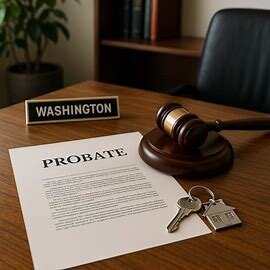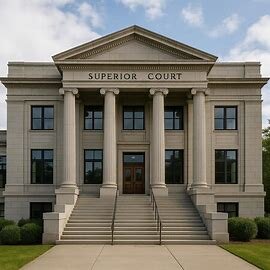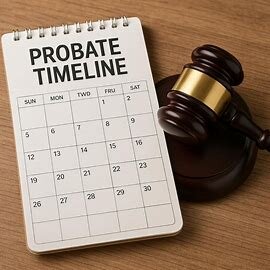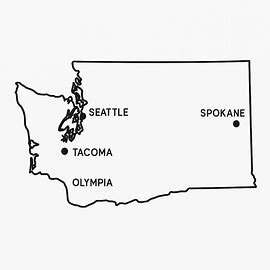Understanding Probate in Washington: Complete 2025 Guide for Homeowners and Heirs

“Your Trusted Home Buyer Local Cash Home Buyer”
Probate in Washington is a complex but important process that ensures property and assets are distributed correctly after someone passes away. It’s a system designed to protect heirs, settle debts, and ensure that ownership of real estate and personal property transfers lawfully.
This 2025 guide offers a complete, educational overview of how probate works in Washington from when it’s required, to how the courts handle it, to what families can do to prepare. Whether you are an executor, heir, or property owner planning ahead, understanding the probate system can save months of stress, delay, and cost.
Table of Contents
- Washington Probate Overview
- When Probate Is Required
- The Complete Probate Process (Step-by-Step)
- Duties of the Personal Representative (Executor)
- Probate Costs, Taxes, and Court Fees
- Real Estate and Probate in Washington
- How to Avoid Probate
- Case Studies: Probate in Washington Cities
- Frequently Asked Questions
- Resources and References
- Conclusion
Washington Probate Overview
Probate is a legal process that takes place after someone dies. In Washington, it’s governed by RCW Title 11 – Probate and Trust Law. The goal is simple: to make sure the deceased person’s estate is handled fairly and in accordance with state law.
The process includes verifying whether a valid will exists, identifying and appraising property, paying debts and taxes, and distributing remaining assets to beneficiaries. Probate also gives creditors a chance to make claims and prevents heirs from fighting over property through informal means.
Every Washington probate case is supervised by the Superior Court in the county where the deceased lived or owned property. Once the court approves the estate’s plan and debts are settled, ownership of property can be legally transferred to heirs or sold to settle the estate.

When Probate Is Required in Washington
Probate is not always required in Washington. However, it becomes necessary when property ownership or debts cannot be resolved without a court’s involvement. Common situations include:
- The deceased owned real estate in their name only (not jointly held).
- The total estate value exceeds $100,000.
- There are unpaid debts, liens, or legal judgments attached to property.
- The deceased did not have a living trust or estate plan.
Probate may not be necessary when assets are jointly owned or have named beneficiaries such as life insurance policies, payable-on-death accounts, or joint tenancy with right of survivorship. Washington also allows property owners to use a Transfer-on-Death (TOD) Deed that names a beneficiary directly on the title. This document allows property to pass directly to the heir without going through probate.

Small Estate Affidavit (RCW 11.62)

For estates worth less than $100,000 and without real estate complications, Washington allows heirs to use a simplified process called the Small Estate Affidavit. This form, outlined in RCW 11.62, lets heirs collect and distribute assets without opening a full probate case. It’s one of the fastest, most affordable ways to settle small estates.
However, if real property is involved like a home, farm, or land formal probate is almost always required before title can legally transfer or a sale can close.
The Complete Probate Process in Washington (Step-by-Step)
Probate in Washington typically takes between six months and one year. The timeline depends on estate complexity, number of heirs, outstanding debts, and court scheduling. Below is a breakdown of the process, month by month, based on Washington law and standard court procedure.

Month 1–2: Filing and Appointment
The process begins when a petition for probate is filed with the Superior Court in the county where the deceased lived. The court validates the will (if one exists) and appoints a Personal Representative (PR) also called an executor or administrator. The PR receives official authorization in the form of Letters Testamentary or Letters of Administration.
If there is no will, the court chooses a close family member to act as the PR. This person is responsible for managing the estate from start to finish, following all court rules under RCW 11.48.
Month 2–4: Creditor Notification and Inventory
The Personal Representative must publish a Notice to Creditors in a local newspaper to alert potential claimants. Known creditors are notified directly. This notice gives creditors four months to file claims. During this time, the PR also compiles an inventory of the estate’s assets, including real estate, vehicles, bank accounts, investments, and personal property.
The estate may also require appraisals for valuable items or real property. The PR is responsible for safeguarding all estate property, keeping accurate records, and ensuring nothing is sold or distributed prematurely.
Month 4–6: Debt Payment and Asset Management
After all valid creditor claims are received, the PR pays legitimate debts including funeral costs, taxes, mortgages, and property expenses. The PR must also maintain real property during this time. If the deceased owned a home, it must be insured, secured, and kept in compliance with local building or health codes.
For example, Spokane homeowners are subject to rules under the Spokane Municipal Code, and Tacoma residents must meet property standards under the Tacoma Municipal Code. Failing to maintain vacant property during probate can lead to citations and fines.
Month 6–9: Sale or Distribution of Property
Once debts are paid, the PR decides whether to sell property or distribute it directly to heirs. If the estate contains real estate, this is often the most complicated step. The sale of a home or land must comply with court approval unless the PR has been granted non-intervention powers — meaning they can act without additional court permission.
Non-intervention powers are common in Washington and are governed by RCW 11.68. They streamline the process, allowing the PR to pay debts, sell property, and distribute assets more efficiently.
Month 9–12: Final Accounting and Estate Closure
When all debts, taxes, and distributions are complete, the PR submits a final accounting to the court, detailing every financial transaction. Once the court approves, the estate can be officially closed. Title transfers or sales recorded after this point become final, and heirs receive any remaining distributions.
While this process can sound complicated, careful recordkeeping and compliance with deadlines can make probate smooth and predictable. Washington’s courts are known for having one of the more straightforward probate systems in the U.S. especially when compared to states with mandatory supervision on every case.
Duties of the Personal Representative (Executor)
The Personal Representative (PR) plays a critical role. They act as the legal agent of the estate and are bound by fiduciary duty to handle all matters with honesty and transparency. Their responsibilities include:
- Collecting and inventorying estate assets.
- Managing bank accounts, insurance, and real estate.
- Notifying creditors and paying verified debts.
- Filing income and estate taxes.
- Maintaining property and paying ongoing expenses.
- Providing regular accounting to the court and heirs.
Executors are entitled to compensation for their work, typically 2–5% of the estate value. However, any mismanagement or misuse of estate funds can result in personal liability under RCW 11.48. Because of this, most executors work closely with probate attorneys or professional accountants to ensure full compliance.

Probate Costs, Taxes, and Court Fees in Washington
Probate costs in Washington vary widely depending on estate size, property type, and attorney involvement. While some families spend only a few hundred dollars handling simple estates, others may face thousands in fees for complex or contested cases.

Typical Probate Expenses
- Court filing fee: $240 – $320 depending on county.
- Attorney fees: Average $3,000 – $10,000+ for full representation.
- Executor compensation: 2–5 percent of total estate value.
- Publication costs: $200 – $400 for the Notice to Creditors.
- Accounting and appraisal fees: $500 – $2,000 for property valuation and bookkeeping.
Some estates also pay extraordinary expenses such as property management for vacant homes, locksmith services, or insurance coverage during administration. Executors can request court approval to reimburse these costs from estate funds.
Estate and Inheritance Taxes
Washington is one of the few states that levies its own estate tax in addition to the federal tax. As of 2025, the state estate-tax threshold is $2.193 million. Estates valued below that amount owe no state estate tax.
| Estate Value | Approximate Tax Rate |
|---|---|
| $2.193 M – $3 M | 10 percent |
| $3 M – $4 M | 14 percent |
| $4 M – $6 M | 16 percent |
| $6 M + | 20 percent (max) |
Federal estate tax begins at $13 million for 2025. Very few Washington estates meet this threshold, meaning the majority of families owe no federal tax at all.
Capital Gains and Stepped-Up Basis
When heirs sell inherited property, they usually benefit from the stepped-up basis rule. The property’s cost basis resets to its fair-market value on the date of death, greatly reducing capital-gains taxes when sold. For example, if a parent purchased a Spokane home in 1985 for $70,000 and it’s worth $350,000 today, the heir’s taxable gain starts at $350,000 – not $70,000. This saves thousands in taxes upon sale.
Executors should always work with an accountant familiar with Washington’s estate tax laws and the Department of Revenue reporting requirements to avoid penalties.
Real Estate and Probate in Washington
Real property houses, condos, land, and farms is often the largest asset in a Washington estate. Selling it through probate requires attention to state and county rules to prevent title issues later.

Title and Ownership Verification
Before any probate sale, the Personal Representative must confirm that the property title is clear of liens and ownership is accurately recorded. A title company performs this check and issues a commitment for title insurance once court authorization is granted.
Obtaining Court Approval
Unless the executor has non-intervention powers under RCW 11.68, most probate real-estate sales require a petition to the court for authorization. The petition includes the proposed sale price, valuation report, and confirmation that the sale is in the estate’s best interest. After approval, the PR can execute a purchase and sale agreement and close through escrow.
Traditional vs. Cash Sales
Executors often face a choice: list the home with a realtor or sell directly to a cash buyer. Each approach has trade-offs:
- Traditional listing: Can yield a higher price but takes longer and requires repairs, inspections, and showings.
- Cash sale: Closes in days without repairs or agent fees, ideal for vacant or distressed homes.
Regardless of method, Washington law requires full disclosure through the Seller Disclosure Statement (Form 17) unless specifically exempt. Buyers and title companies will not close without proper probate documentation and signed court orders if needed.
Maintaining Property During Probate
Vacant homes must still be insured and secured throughout the process. Executors are responsible for preventing frozen pipes, mold, and vandalism. Cities like Seattle and Tacoma enforce strict property-maintenance codes, and unattended homes can accrue fines under the Tacoma Municipal Code or Spokane Municipal Code.
How to Avoid Probate in Washington
Many Washington residents plan ahead to help their families avoid probate altogether. Several legal tools can transfer property automatically without court involvement.
- Living Trust: Property placed in a trust passes directly to beneficiaries and bypasses probate.
- Transfer-on-Death Deed (TOD): Recorded with the county auditor, it names a beneficiary to inherit real estate upon death.
- Joint Tenancy with Right of Survivorship: Automatically gives the surviving owner full title to the property.
- Community Property Agreement: Allows spouses to transfer assets without probate upon the first death.
- Payable-on-Death Accounts: Bank and investment accounts can list beneficiaries who receive funds immediately.
Each method requires precise documentation to remain valid under Washington law. Residents should consult estate-planning attorneys or financial advisors before executing these documents to avoid errors that could trigger probate later.

Case Studies: Probate Across Washington Cities

Spokane County
A family in the Logan Neighborhood of Spokane inherited a 1940s bungalow with foundation issues and an outdated roof. The executor used non-intervention powers to authorize a cash sale, cleared city utility debts, and closed within six weeks. The court approved distribution immediately, allowing the family to avoid months of holding costs.
Tacoma
Two siblings inherited a duplex in South Tacoma with minor code violations. By working with city inspectors through Tacoma Code Enforcement, they corrected issues and sold the property as-is. Proceeds paid remaining medical bills and settled the estate within eight months.
Seattle
In Seattle’s Ballard neighborhood, a probate estate faced conflict among four heirs. The Superior Court appointed a neutral administrator to avoid delays. After selling the home through a probate-experienced broker and paying off a tax lien, the estate distributed funds within one year.

Yakima
A Yakima farmland estate included unpermitted irrigation improvements. The executor coordinated with Yakima County Planning and Building Division to resolve permits before closing a cash sale to a neighboring farmer. The estate closed in nine months without litigation.
Walla Walla
In Walla Walla, a vineyard estate was split between trust and probate assets. Attorneys used limited probate to transfer non-trust parcels while keeping the rest under trust management, reducing court oversight time by half.
Everett
An Everett condo had unpaid HOA dues and a small mechanic’s lien. By citing RCW 64.38.100 and working with the association, the executor negotiated a lien release before closing. This kept title clear and ensured buyers could obtain financing.
Pasco
In Pasco, a family home sat vacant for two years after the owner passed away. The executor used the City of Pasco property-maintenance program to bring the yard and structure into compliance before selling. Proceeds funded charitable gifts specified in the will.
Frequently Asked Questions About Probate in Washington
The Washington probate system raises many questions for executors, heirs, and property owners. These expanded answers are based on state law, RCWs, and typical experiences across Washington counties.
- How long does probate take in Washington?
A standard probate case takes about six to twelve months. Simple estates may close in as little as four months, while complex or disputed estates can last 18–24 months. Delays usually stem from property sales, tax issues, or disagreements among heirs. - Do all estates require probate?
No. Estates under $100,000 or those that use trusts, joint ownership, or transfer-on-death deeds can bypass full probate. The Small Estate Affidavit (RCW 11.62) is often enough for small estates without real property. - What happens if someone dies without a will?
Washington’s intestacy laws under RCW 11.04 determine how property is distributed. The court appoints an administrator, usually a surviving spouse or adult child, to manage the estate. - Can a house be sold before probate is finished?
Yes — but only with court approval or when the executor has non-intervention powers. Sales must follow court-supervised procedures to ensure fairness and proper distribution of proceeds. - Can an executor live in the house during probate?
In most cases, yes. The executor may occupy the property temporarily but must account for fair rental value if required by other heirs. The court may restrict occupancy if it delays the sale or affects estate value. - Who pays property taxes during probate?
The estate is responsible for paying ongoing taxes, insurance, and maintenance. These expenses are reimbursed from estate funds before final distributions to heirs. - What if the deceased had outstanding debts or liens?
Creditors must file claims within four months after the Notice to Creditors is published. Valid debts are paid before heirs receive distributions. If a home has liens, they must be released before title transfers or the property is sold. - Can an executor be removed?
Yes. Under RCW 11.28.250, the court can remove an executor for fraud, neglect, or failure to perform duties. A replacement administrator will then be appointed. - What are “non-intervention powers”?
Non-intervention powers, granted under RCW 11.68, allow the executor to act independently without frequent court approval. This greatly speeds up the process and is common in Washington for uncontested estates. - How are disputes among heirs handled?
Disagreements may be settled through mediation or court hearings. The court’s priority is preserving estate value and following the law, even if that means authorizing a sale against one heir’s wishes. - What is a Personal Representative’s bond?
A bond is a form of insurance that protects the estate from executor misconduct. The court may waive it if all heirs agree or if the will specifically states no bond is required. - Can probate be opened years after death?
Yes, but it becomes more complex. Title companies may require additional documentation to confirm ownership history. It’s best to open probate within months of death to avoid tax and legal issues. - What are the penalties for not opening probate?
Failing to open probate when required can leave property titles clouded and prevent sales. It can also expose heirs to personal liability for unpaid debts or taxes. - How do trusts help avoid probate?
A living trust owns property during the owner’s lifetime and transfers it directly to beneficiaries after death. Because ownership doesn’t pass through the estate, the court isn’t involved. - What happens to mortgages and utilities?
Mortgages must continue to be paid during probate, as well as utilities for any property maintained by the estate. Executors may use estate funds to cover these costs. - Do I need a lawyer for probate in Washington?
Not always, but it’s recommended for larger or disputed estates. Attorneys ensure compliance with filing deadlines, tax laws, and sale procedures. Many counties allow limited representation for simple filings. - What are the main forms required?
Typical forms include the Petition for Probate, Letters Testamentary or Administration, Inventory and Appraisement, Notice to Creditors, and Final Accounting. Each county provides templates through its Superior Court website. - Can probate documents be filed online?
Some counties, including King, Pierce, and Spokane, allow e-filing of probate documents. Contact your local Superior Court Clerk’s Office for details. - Can heirs manage the sale remotely?
Yes. Washington permits remote notarization and digital signatures for probate-related real estate sales. This is especially useful for out-of-state heirs managing property from afar. - What happens after probate closes?
The Personal Representative files a final report with the court showing all debts paid and distributions completed. Once approved, the estate is closed permanently and heirs take full ownership of their inherited assets.
Resources and References
Below are some of the most trusted sources for Washington probate information and legal forms:
- RCW Title 11 – Probate and Trust Law
- RCW 11.62 – Small Estate Affidavit
- Washington State Court Probate Forms
- Washington Department of Revenue – Estate Tax Division
- City of Seattle – Probate and Estate Planning Resources
- City of Tacoma
- City of Spokane
- City of Yakima
- City of Walla Walla
- REI Branded Home Buyer – Washington Real Estate Education
Conclusion
Probate is an essential part of Washington’s legal framework, protecting heirs, creditors, and property rights. While it can seem intimidating, it provides structure and fairness during a difficult time. With the right guidance, families can navigate the process smoothly ensuring that estates are handled responsibly and legacies are preserved.
Executors and heirs should familiarize themselves with Washington’s probate laws, deadlines, and documentation requirements early on. Staying organized, maintaining communication with the court, and seeking legal or financial advice when necessary are the keys to completing probate efficiently.
For educational reference and general understanding, you can explore RCW Title 11 and related county resources listed above. Knowledge of these processes empowers Washington residents to make informed decisions about estate planning, property management, and future inheritance transfers.

About REI Branded Home Buyer
REI Branded Home Buyer is an educational real estate resource serving homeowners across Washington. Our mission is to help residents understand the state’s housing, probate, and property-sale processes through transparent, factual, and locally relevant information. For more learning materials, visit our official website or contact our team.
Website: www.reibrandedhomebuyer.com
Email: info@reibrandedhomebuyer.com
Phone: 509-769-3439
Disclaimer: This article is for educational purposes only and does not constitute legal, financial, or tax advice. For guidance on your individual situation, please consult a licensed Washington probate attorney or estate-planning professional.
Additional Resources To Help Sell Your House In Washington
Get a Cash Offer for my Property Today!

About REI Branded Home Buyer
Real People. Real Stories. Real Solutions. We’re George and TJ — two regular guys who teamed up to create REI Branded Home Buyer, a local company with one simple mission: to help people sell their homes without stress, games, or pressure. We actually met at a local real estate meetup. A mutual friend randomly shouted, “Hey George, do you want to be this guy’s mentor?” George laughed and said, “Just give him my cell!” A coffee meeting later, and the rest is history. We've been working together ever since. Our passion for helping homeowners comes from personal experience. George was once homeless, so he deeply understands what it’s like to face housing uncertainty. TJ’s family went through a crisis and had to sell their home fast — with the help of a cash homebuyer. Those experiences shaped who we are and inspired us to create a company that treats people the way we wish we’d been treated. Let’s be real: the real estate world is full of shady companies, pushy salespeople, and sleazy homebuyers who care more about profit than people. We started REI Branded Home Buyer because we believe it should be the other way around — people first, profit second. We’re proud to call Spokane home. Our wives, Jenny and Michelle, love the slower pace of life here and all the outdoor beauty Washington has to offer. George and Jenny have two amazing daughters and two dogs — they love to travel and recently visited Japan to see their daughter abroad. TJ and Michelle are outdoor lovers through and through — backpacking, hiking, hunting, fishing, even rock climbing. Michelle’s become quite the mountaineer! If you’re thinking about selling a house — no matter the reason — we’d love to hear your story and see how we can help.
